译林版(2019)必修第三册 Unit 4 Scientists Who Changed the World Grammar and usage 课件(65张ppt)
文档属性
| 名称 | 译林版(2019)必修第三册 Unit 4 Scientists Who Changed the World Grammar and usage 课件(65张ppt) |

|
|
| 格式 | pptx | ||
| 文件大小 | 7.4MB | ||
| 资源类型 | 教案 | ||
| 版本资源 | 牛津译林版(2019) | ||
| 科目 | 英语 | ||
| 更新时间 | 2022-09-21 11:34:19 | ||
图片预览


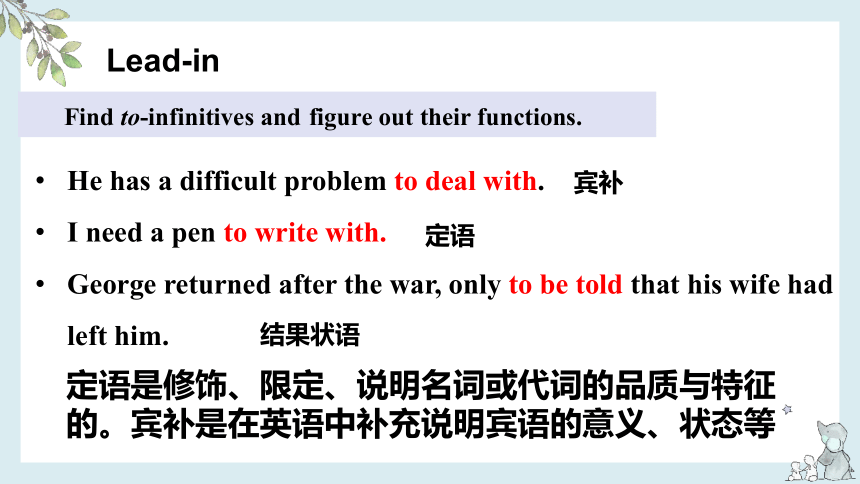
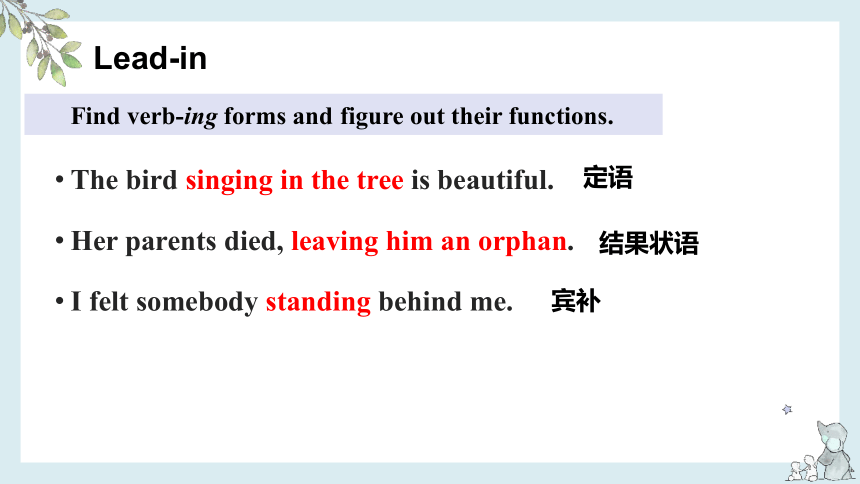

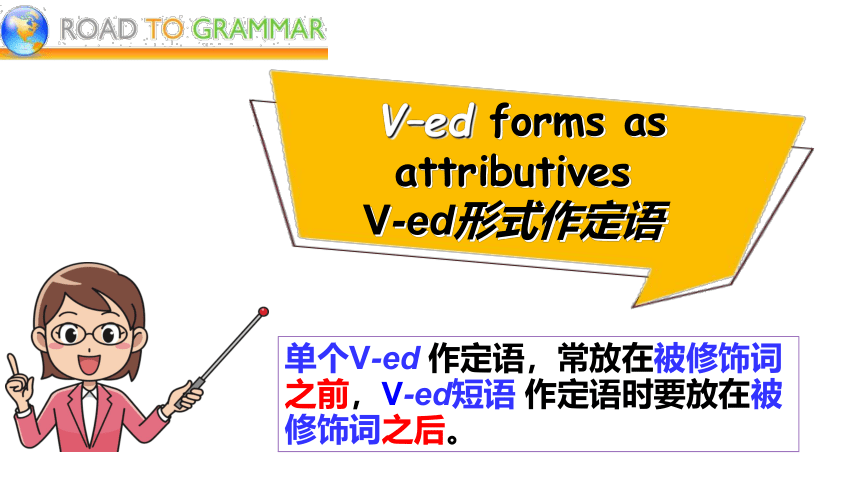
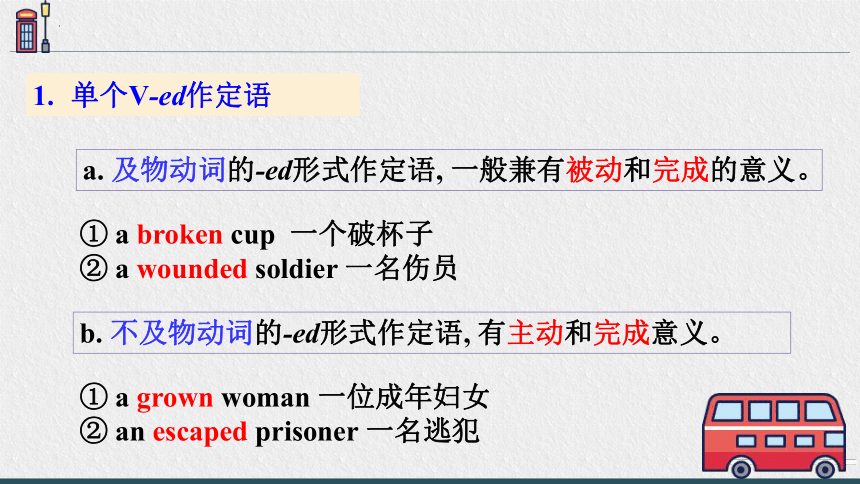
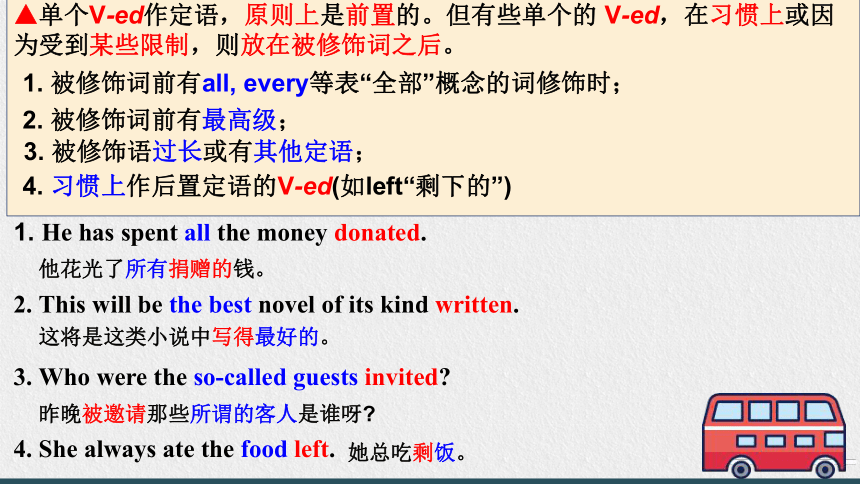
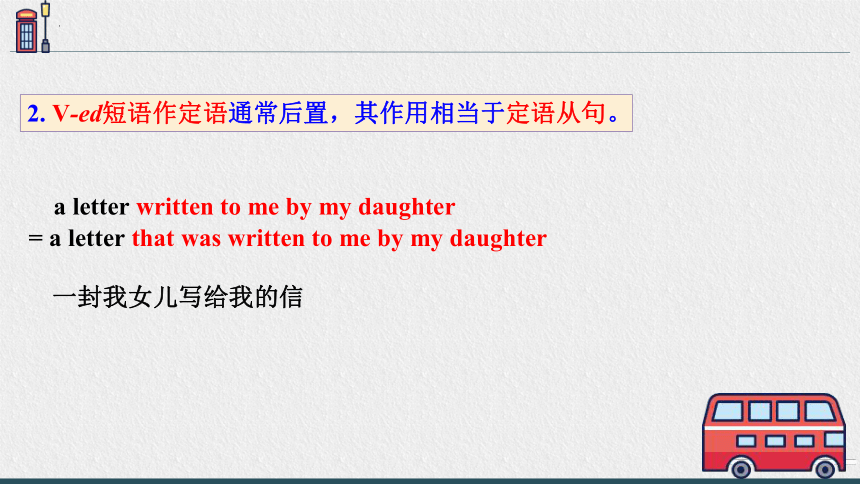
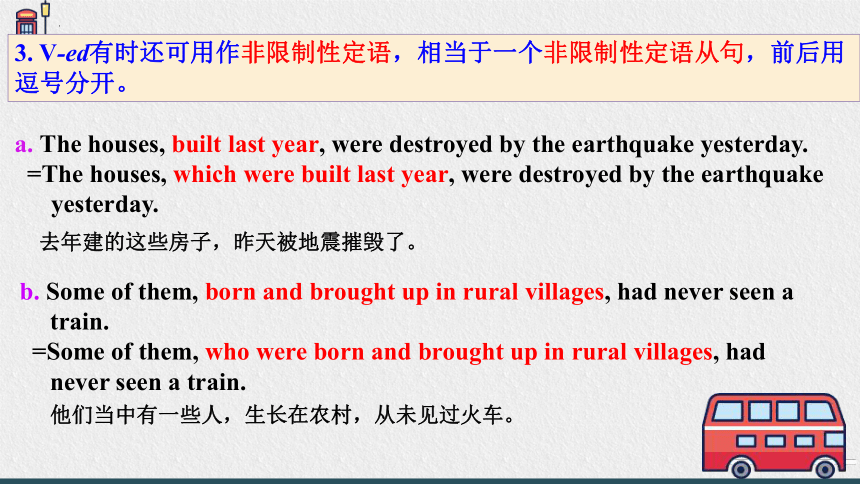
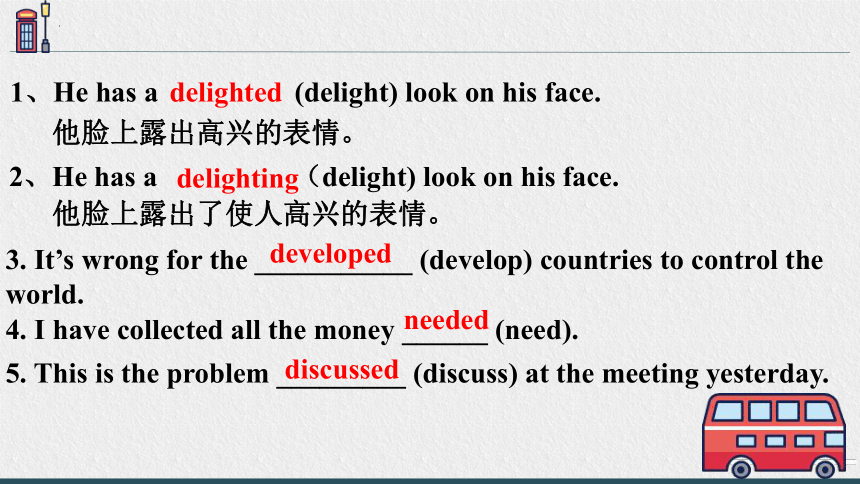

文档简介
(共62张PPT)
空白演示
单击输入您的封面副标题
Unit 4
P3
Grammar and usage
What is nonfinite Verbs (非谓语)
英语一句话只能有一个谓语动词
如果出现更多动词:
① 加连词(and / but / so…)变为两个句子
③ 变为非谓语动词
Studying hard, you will reach your goal.
② 放入从句
If you study hard, you will reach your goal.
Study hard, and you will reach your goal.
Find to-infinitives and figure out their functions.
Lead-in
He has a difficult problem to deal with.
I need a pen to write with.
George returned after the war, only to be told that his wife had left him.
宾补
定语
结果状语
定语是修饰、限定、说明名词或代词的品质与特征的。宾补是在英语中补充说明宾语的意义、状态等
The bird singing in the tree is beautiful.
Her parents died, leaving him an orphan.
I felt somebody standing behind me.
Find verb-ing forms and figure out their functions.
Lead-in
结果状语
宾补
定语
All the broken windows have been repaired.
Inspired by Mr Chen’s speech, they decided to study science harder.
I heard my name called in the street.
Find verb-ed forms and figure out their functions.
Lead-in
定语
宾补
原因状语
V–ed forms as attributives
V-ed形式作定语
单个V-ed 作定语,常放在被修饰词之前,V-ed短语 作定语时要放在被修饰词之后。
单个V-ed作定语
a. 及物动词的-ed形式作定语, 一般兼有被动和完成的意义。
b. 不及物动词的-ed形式作定语, 有主动和完成意义。
① a grown woman 一位成年妇女
② an escaped prisoner 一名逃犯
① a broken cup 一个破杯子
② a wounded soldier 一名伤员
▲单个V-ed作定语,原则上是前置的。但有些单个的 V-ed,在习惯上或因为受到某些限制,则放在被修饰词之后。
1. He has spent all the money donated.
2. This will be the best novel of its kind written.
3. Who were the so-called guests invited
4. She always ate the food left.
1. 被修饰词前有all, every等表“全部”概念的词修饰时;
2. 被修饰词前有最高级;
3. 被修饰语过长或有其他定语;
4. 习惯上作后置定语的V-ed(如left“剩下的”)
他花光了所有捐赠的钱。
这将是这类小说中写得最好的。
昨晚被邀请那些所谓的客人是谁呀
她总吃剩饭。
a letter written to me by my daughter
= a letter that was written to me by my daughter
一封我女儿写给我的信
2. V-ed短语作定语通常后置,其作用相当于定语从句。
3. V-ed有时还可用作非限制性定语,相当于一个非限制性定语从句,前后用逗号分开。
a. The houses, built last year, were destroyed by the earthquake yesterday.
=The houses, which were built last year, were destroyed by the earthquake yesterday.
去年建的这些房子,昨天被地震摧毁了。
b. Some of them, born and brought up in rural villages, had never seen a train.
=Some of them, who were born and brought up in rural villages, had never seen a train.
他们当中有一些人,生长在农村,从未见过火车。
developed
needed
discussed
他脸上露出了使人高兴的表情。
1、He has a (delight) look on his face.
delighted
他脸上露出高兴的表情。
2、He has a (delight) look on his face.
delighting
3. It’s wrong for the ___________ (develop) countries to control the
world.
4. I have collected all the money ______ (need).
5. This is the problem _________ (discuss) at the meeting yesterday.
V–ed forms as adverbials
V-ed形式作状语
Bitten by the cobra, the man was in
danger.
Destroyed by the hurricane, the old house is nowhere to be found.
(As/Because it has been)
(Because he was)
1. 作原因状语
由于飓风的破坏,那座老房子哪也找不到了。
因为被眼镜蛇咬了,这人处在危险中。
Water boils, heated to 100℃.
Seen from the top of the building, our
school looks beautiful.
(When it is)
(when it is)
2. 作时间状语
从楼顶上看,学校看起来很美。
水加热到100度就沸腾。
Punished by the parents, he won't come again.
(Although he was)
(If he is)
虽然他很疲倦,他仍然继续工作。
他若是被家长惩罚了,就再也不能来了。
3. 作让步状语
Tired, he went on working.
4. 作条件状语
Absorbed in the work, he neglected food and sleep.
She walked out of the house, followed by
her little daughter.
(and she was)
(He was)
5. 作伴随或方式状语
她走出房间,后面跟着她的小女儿。
他专心于工作,废寝忘食。
1. Asked what had happened, he kept silent.
2. Caught in a heavy rain, he was all wet.
3.He listened to the hero’s true story, moved to tears.
4. Given more time, we would be able to do the work much better.
5.Left alone at home, the little boy didn't feel afraid at all.
6.An old man was crossing the street, supported by his son.
7. The teacher entered the classroom, followed by some students.
时间
原因
结果
条件
让步
伴随
动词-ed形式可以表示时间、原因、结果、条件、让步、方式或伴随状况等,其作用相当于状语从句或并列句。
方式
1.When he was asked what had happened, he kept silent.
2.Because he was caught in a heavy rain, he was all wet.
3.He listened to the hero’s true story, and he was moved to tears.
4.If we were given more time, we would be able to do the work much better.
5.Although he was left alone at home, the little boy didn’t feel afraid at all.
6.An old man was crossing the street, and he was supported by his son.
7.The teacher entered the classroom, and he was followed by some students.
V-ed充当状语时,其逻辑主语必须与句子的主语一致。
Change the sentences into complete ones.
1. When heated, ice will be changed into water.
2. Unless invited, I won't attend his wedding.
3. Once caught smoking in the kitchen, the cook will be fired.
When it is heated, ice will be changed into water.
Unless I am invited, I won't attend his wedding.
Once the cook is caught smoking in the kitchen, he will be fired.
V-ed作状语有时可保留连词,构成“连词+V-ed”结构,即:
while, when, once, as, though, unless, if 等连词)+V-ed。
______ from the top of the building, the school looks beautiful.
______ from the top of the building, we found the school
beautiful.
Seen
Seeing
从楼顶上看,学校看起来很美。
我们从楼顶往下看,发现学校很美。
如果句子的主语和分词是主动关系,时间正在发生用V-ing形式。
如果句子的主语和分词是被动关系,时间已经完成用V-ed形式。
1. __________ (compare) Shanghai with Xi'an, we found Shanghai is larger.
2. _________ (compare) with Xi'an, Shanghai is larger.
Comparing
Compared
V–ed forms as object
complements
V-ed形式作宾补
1. 表示感观、感觉和发觉的动词。如:
watch, observe, see, hear, listen to, feel, notice, find等。
① When we got to school, we saw the door locked.
② He found his house broken into when he got back home.
V-ed作宾语补足语常用于以下几种情况:
当我们到学校时,我们看见门锁着。
回到家他发现家被盗。
2. 表示“致使”意义的动词。 如:have, make, get, keep等。
① She had to shout to make herself heard above the sound of the music.
② We're having our car repaired.
③ I'm trying to get this article finished for Thursday.
她不得不大喊大叫,好让自己的声音盖过音乐声。
我们正在请人修理汽车。
我正在努力把这篇周四要写的文章写完。
3. 表示“希望、愿望、命令”意义的动词。
如:want, expect, would like, wish, order等。
① The teacher wouldn't like the problem discussed at the moment.
老师不想此刻讨论这个问题。
② I want the suit made to his own measure.
我想要这套衣服照他自己的尺寸做。
Fill in the blanks, using the correct verb forms.
1. The hall was too noisy for the speaker to make himself _____ (hear).
2. We found all the rivers seriously __________ (pollute).
3. Alice got her bad tooth __________ (pull out) in the hospital.
polluted
pulled out
Practice
heard
Ⅱ.用括号内所给单词的适当形式填空。
1. Watching the __________ (finishing/finished) painting, Alice couldn't help smiling.
2. Most of the artists __________ (inviting/invited) to the party were from South Africa.
3. Do you still remember the Olympic Games _____(held/holding)
in Beijing in 2008
4. The __________ (surprising/surprised) look on her face suggested that she hadn't known the news before.
5. There are many ________ (fallen / falling) leaves on the street.
finished
invited
held
surprised
fallen
6. __________ (frighten) by the noise outside, Sue
dared not sleep in her bedroom.
7. __________ (compare) with our small flat, Bill's
house seemed like a palace.
8. The lady returned home, ________ (follow) by the
famous detective Holmes.
Frightened
Compared
followed
9、She won't have her long and beautiful hair _____
(cut) short.
cut
10. My computer broke down this morning, and I
will get it ________ (repair) as soon as possible.
repaired
Giving only fruit for dinner, I am very angry. Go and catch a sheep!
Given
Worn a sheep’s coat, I have made the stupid sheep open the door for me. Ha ha …
Wearing
Catching by Mr. Wolf, Mr. Lazy cried.
Found Mr. Wolf get into our village, I beat him with a large hammer.
Caught
Finding
Beating by the sheep, I am badly injured. But I will never give up!
Beaten
Tiring but happy, we can enjoy ourselves without any fear!
Tired
Find verb-ed forms in the article and fill in the table below. The first one has been done for you.
We should know the difference between verb-ed and the past form in the past tense.
我们应该知道过去分词和过去式的区别。
Henry is reading a science magazine article about a world-changing discovery made by accident. Read through the article and fill in the following table.
Tu Youyou Alexander Fleming
Nationality
Discovery
Time of discovery
Use of discovery
Effect of discovery
Prize
Chinese
Scottish
Qinghaosu
Penicillin
1972
1928
Treat malaria
Treat wounds/ kill bacteria
Benefited millions of patients
Saved millions of life
Nobel Prize, 2015
Nobel Prize, 1945
https://www./video/BV1X4411i7B2 share_source=copy_web
亚历山大·弗莱明——青霉素
Do you know how penicillin was discovered by Fleming
A Exploring the rules
Henry is reading a science magazine article about a world-changing discovery. Find the verb-ed forms
in the article and fill in the table below.
The first one has been done for you.
偶然地,意外地
远非,几乎相反
V-ed forms as attributives something produced by the mould
V-ed forms as adverbials
V-ed forms as object complements
the prepared mind
get its mass production started
Surprised by this
Surprised by this, Fleming performed some tests.
谓语
非谓语
过去分词做状语,描述主语状态
对此感到惊讶,弗莱明做了一些测试。
What can you find out from the example sentences
你能从例句中发现什么
The results indicated that something produced by the mould had killed the bacteria.
谓语
非谓语
作定语修饰something, something与produced之间为被动关系
结果表明,霉菌产生的某种物质杀死了这种细菌。
... his hard work and determination helped get its
mass production started.
谓语
非谓语
宾语与宾补为被动关系
他的努力和决心帮助青霉素开始大规模生产。
Fortune favours the prepared mind.
谓语
非谓语
幸运眷顾有准备的人。
提喻(synecdoche): 不直接说某一事物的名称,而用跟它有关系的另一种事物的名称来称呼它的修辞手段
你有钱吗
Outside, there is a sea of faces
外面街上,人山人海。
Have you any coppers
They share the same roof
他们住在一起。
a. 部分代替整体
b.以材料代替事物
提喻 (借代)大致归纳为四种情况:
c. 抽象和具体互代
d.以个体代替整个类别
He is the Newton of this century.
he earned his bread as a teacher
他以教书为生
他是本世纪的科学家。
具体代抽象
抽象代具体
he came to visit sickness and poverty
他来探望病人和穷人
Working out the rules
The verb-ed form can be used like an adjective or an adverb,
indicating a(n) (1) ________ (active/passive) meaning.
The verb-ed form can appear before or after a noun. It
modifies the noun like a(n) (2) _____________ (relative
clause/adverbial clause).
The verb-ed form can be used as an adverbial or an object
complement.
passive
relative clause
Rewrite the following sentences using a verb-ed form as an attributives, adverbial or object complement.
1 The scientist who has been highly praised won an
award.
The highly praised scientist won an award.
Atributive 定语
2 The experiment that is mentioned in your article is
interesting.
3 The patients soon recovered because they were treated with the new medicine.
The experiment mentioned in your article is interesting.
Treated with the new medicine, the patients soon recovered.
Attributive 定语
Adverbial of cause 原因状语
4 The scientist found that the equipment in the laboratory had been destroyed.
5 Once this report is finished, it will be very useful for future
research.
The scientist found the equipment in the laboratory destroyed.
Once finished, this report will be very useful for future research.
Oject complement 宾补
Averbial of condition/time 条件/时间状语
Henry is reading an article about Franklin's kite plete the article below with the correct verb-ed forms or verb-ing forms.
We should analyze the relationship between the logic subject and the verb to decide whether it is passive or active.
我们应该分析逻辑主语与动词之间的关系来判断它是被动的还是主动的。
Benjamin Franklin
本杰明·富兰克林
https://www./video/BV1Ht411s7q2 share_source=copy_web
Benjamin Franklin was a famous scientist, writer, printer, inventor and politician. As a scientist, he was well known for his kite experiment. The story goes like this: Franklin had found lightning _____________ (interest) for years, believing it was actually electricity. He designed an experiment to prove his theory.
He worked out that by flying a kite during a thunderstorm, electricity could go through the wet kite line down to earth.
interesting
________ (know) it was too dangerous to hold the wet line, Franklin held a silk ribbon ________ (tie) to the end of it. He made sure the silk ribbon stayed dry so that the electricity would not go through his body. Then he attached a metal key where the ribbon and kite line joined. When a thunderstorm approached, the lightning would charge the key. ___________ (conduct) on a stormy day in 1752, his experiment proved lightning really was just electricity.
Knowing
tied
Conducted
Franklin had his theory _________ (accept) by many people. However, some people questioned whether he had actually done the experiment, __________ (argue) that if he had really done it, he would have received a deadly electric shock. Whatever the truth, Franklin did make contributions to the studies of electricity.
arguing
accepted
1. He observed that the bacteria surrounding the mould were dead.
他发现霉菌周围的细菌都死了。 (P48 L5-6)
surround v. (使)包围, 环绕; 围绕
【用法】
surround ... with … 用……包围……
be surrounded by/ with sth./ sb.被某物/某人所包围
eg Tall trees surround the lake.
The lake is surrounded with/by trees.
【拓展】
surrounding adj. (作定语) 周围的; 附近的
surroundings n. (pl.) 环境 (同environment)
【语境应用】用surround的适当形式填空。
1) Lucy was sitting on the floor ____________ by toys.
2) We decided to explore the _____________ countryside.
3) When he came back to life, he found
himself _____________ by his children.
4) It’s important to work in friendly ______________.
surrounded
surrounding
surrounded
surroundings
单句语法填空。
And when he saw the mists rising from the river and the soft clouds ____________ (surround) the mountain tops (2020 全国卷III)
surrounding
2. The results indicated that something produced by the mould
had killed the bacteria. (P48 L7)
结果表明,霉菌产生的某种物质杀死了这种细菌。
indicate v.表明
Research indicates that eating habits are changing fast.
研究表明,饮食习惯正在迅速改变。
【用法】
indicate sth. to sb. 向某人指示……
indicate that ... 指示……;表明……
【拓展】
indication n. 象征; 显示; 标示
There is no indication that... 无迹象表明……
There are some indications that... 有迹象表明……
There are clear indications that the economy is improving.
有明显的迹象表明经济正在好转。
3. Fortune favours the prepared mind.(P48 L16)
幸运眷顾有准备的人。
favour v. 偏袒,支持,赞同,有利于
当前的经济不利于小型企业的发展。
The current economy does not favour the development of small businesses.
It remains to be seen if the show will still find favour with a 1990s audience...
这部电视剧是否还会受到90年代观众的青睐还有待观察。
【拓展】
n. 恩惠; 照顾; 好意; 关心; 支持
do sb. a favour 帮某人忙
in favour 得宠
(go) out of favour 失宠
in favour of 赞成; 支持; 有利于
【语境应用】完成句子。
1) Could you _______________ and tell Kelly I can’t make it
你帮个忙告诉凯莉说我来不了好吗?
2) Grammar-based teaching methods ________
__________ in the 60s and 70s.
在六七十年代,以语法为基础的教学法失宠了。
do me a favour
went out
of favour
4. When a thunderstorm approached, the lightning would
charge the key. (P49 L10) 当雷雨来临时,闪电将会给钥匙充电
charge v. ① 收费 ② 控诉 ③充电
1、The restaurant charged 20 for dinner.
2、Several people were arrested but nobody was charged.
3、Before use, the battery must be charged.
这家餐馆的晚餐收费20英镑。
有几人被捕,但没有人被起诉。
电池在使用前必须充电。
【用法】
charge sb. for 为……向某人收取费用
charge sb. with (doing) sth. = accuse sb. of
控告某人(做)某事
【拓展】
n. 费用; 主管
take charge of 掌管;负责……
in charge of 主管,负责……
in/under the charge of 由……负责
free of charge 免费
【语境应用】完成句子。
1) Your order will be delivered _____________ (免费) within a ten mile limit.
2) They charged me five dollars ______ a cup of coffee.
3) The project is ________________ (在……掌管之下) an experienced engineer.
4) The man arrested by the police ________________ (被指控) stealing.
was charged with
free of charge
for
in the charge of
Thank you
空白演示
单击输入您的封面副标题
Unit 4
P3
Grammar and usage
What is nonfinite Verbs (非谓语)
英语一句话只能有一个谓语动词
如果出现更多动词:
① 加连词(and / but / so…)变为两个句子
③ 变为非谓语动词
Studying hard, you will reach your goal.
② 放入从句
If you study hard, you will reach your goal.
Study hard, and you will reach your goal.
Find to-infinitives and figure out their functions.
Lead-in
He has a difficult problem to deal with.
I need a pen to write with.
George returned after the war, only to be told that his wife had left him.
宾补
定语
结果状语
定语是修饰、限定、说明名词或代词的品质与特征的。宾补是在英语中补充说明宾语的意义、状态等
The bird singing in the tree is beautiful.
Her parents died, leaving him an orphan.
I felt somebody standing behind me.
Find verb-ing forms and figure out their functions.
Lead-in
结果状语
宾补
定语
All the broken windows have been repaired.
Inspired by Mr Chen’s speech, they decided to study science harder.
I heard my name called in the street.
Find verb-ed forms and figure out their functions.
Lead-in
定语
宾补
原因状语
V–ed forms as attributives
V-ed形式作定语
单个V-ed 作定语,常放在被修饰词之前,V-ed短语 作定语时要放在被修饰词之后。
单个V-ed作定语
a. 及物动词的-ed形式作定语, 一般兼有被动和完成的意义。
b. 不及物动词的-ed形式作定语, 有主动和完成意义。
① a grown woman 一位成年妇女
② an escaped prisoner 一名逃犯
① a broken cup 一个破杯子
② a wounded soldier 一名伤员
▲单个V-ed作定语,原则上是前置的。但有些单个的 V-ed,在习惯上或因为受到某些限制,则放在被修饰词之后。
1. He has spent all the money donated.
2. This will be the best novel of its kind written.
3. Who were the so-called guests invited
4. She always ate the food left.
1. 被修饰词前有all, every等表“全部”概念的词修饰时;
2. 被修饰词前有最高级;
3. 被修饰语过长或有其他定语;
4. 习惯上作后置定语的V-ed(如left“剩下的”)
他花光了所有捐赠的钱。
这将是这类小说中写得最好的。
昨晚被邀请那些所谓的客人是谁呀
她总吃剩饭。
a letter written to me by my daughter
= a letter that was written to me by my daughter
一封我女儿写给我的信
2. V-ed短语作定语通常后置,其作用相当于定语从句。
3. V-ed有时还可用作非限制性定语,相当于一个非限制性定语从句,前后用逗号分开。
a. The houses, built last year, were destroyed by the earthquake yesterday.
=The houses, which were built last year, were destroyed by the earthquake yesterday.
去年建的这些房子,昨天被地震摧毁了。
b. Some of them, born and brought up in rural villages, had never seen a train.
=Some of them, who were born and brought up in rural villages, had never seen a train.
他们当中有一些人,生长在农村,从未见过火车。
developed
needed
discussed
他脸上露出了使人高兴的表情。
1、He has a (delight) look on his face.
delighted
他脸上露出高兴的表情。
2、He has a (delight) look on his face.
delighting
3. It’s wrong for the ___________ (develop) countries to control the
world.
4. I have collected all the money ______ (need).
5. This is the problem _________ (discuss) at the meeting yesterday.
V–ed forms as adverbials
V-ed形式作状语
Bitten by the cobra, the man was in
danger.
Destroyed by the hurricane, the old house is nowhere to be found.
(As/Because it has been)
(Because he was)
1. 作原因状语
由于飓风的破坏,那座老房子哪也找不到了。
因为被眼镜蛇咬了,这人处在危险中。
Water boils, heated to 100℃.
Seen from the top of the building, our
school looks beautiful.
(When it is)
(when it is)
2. 作时间状语
从楼顶上看,学校看起来很美。
水加热到100度就沸腾。
Punished by the parents, he won't come again.
(Although he was)
(If he is)
虽然他很疲倦,他仍然继续工作。
他若是被家长惩罚了,就再也不能来了。
3. 作让步状语
Tired, he went on working.
4. 作条件状语
Absorbed in the work, he neglected food and sleep.
She walked out of the house, followed by
her little daughter.
(and she was)
(He was)
5. 作伴随或方式状语
她走出房间,后面跟着她的小女儿。
他专心于工作,废寝忘食。
1. Asked what had happened, he kept silent.
2. Caught in a heavy rain, he was all wet.
3.He listened to the hero’s true story, moved to tears.
4. Given more time, we would be able to do the work much better.
5.Left alone at home, the little boy didn't feel afraid at all.
6.An old man was crossing the street, supported by his son.
7. The teacher entered the classroom, followed by some students.
时间
原因
结果
条件
让步
伴随
动词-ed形式可以表示时间、原因、结果、条件、让步、方式或伴随状况等,其作用相当于状语从句或并列句。
方式
1.When he was asked what had happened, he kept silent.
2.Because he was caught in a heavy rain, he was all wet.
3.He listened to the hero’s true story, and he was moved to tears.
4.If we were given more time, we would be able to do the work much better.
5.Although he was left alone at home, the little boy didn’t feel afraid at all.
6.An old man was crossing the street, and he was supported by his son.
7.The teacher entered the classroom, and he was followed by some students.
V-ed充当状语时,其逻辑主语必须与句子的主语一致。
Change the sentences into complete ones.
1. When heated, ice will be changed into water.
2. Unless invited, I won't attend his wedding.
3. Once caught smoking in the kitchen, the cook will be fired.
When it is heated, ice will be changed into water.
Unless I am invited, I won't attend his wedding.
Once the cook is caught smoking in the kitchen, he will be fired.
V-ed作状语有时可保留连词,构成“连词+V-ed”结构,即:
while, when, once, as, though, unless, if 等连词)+V-ed。
______ from the top of the building, the school looks beautiful.
______ from the top of the building, we found the school
beautiful.
Seen
Seeing
从楼顶上看,学校看起来很美。
我们从楼顶往下看,发现学校很美。
如果句子的主语和分词是主动关系,时间正在发生用V-ing形式。
如果句子的主语和分词是被动关系,时间已经完成用V-ed形式。
1. __________ (compare) Shanghai with Xi'an, we found Shanghai is larger.
2. _________ (compare) with Xi'an, Shanghai is larger.
Comparing
Compared
V–ed forms as object
complements
V-ed形式作宾补
1. 表示感观、感觉和发觉的动词。如:
watch, observe, see, hear, listen to, feel, notice, find等。
① When we got to school, we saw the door locked.
② He found his house broken into when he got back home.
V-ed作宾语补足语常用于以下几种情况:
当我们到学校时,我们看见门锁着。
回到家他发现家被盗。
2. 表示“致使”意义的动词。 如:have, make, get, keep等。
① She had to shout to make herself heard above the sound of the music.
② We're having our car repaired.
③ I'm trying to get this article finished for Thursday.
她不得不大喊大叫,好让自己的声音盖过音乐声。
我们正在请人修理汽车。
我正在努力把这篇周四要写的文章写完。
3. 表示“希望、愿望、命令”意义的动词。
如:want, expect, would like, wish, order等。
① The teacher wouldn't like the problem discussed at the moment.
老师不想此刻讨论这个问题。
② I want the suit made to his own measure.
我想要这套衣服照他自己的尺寸做。
Fill in the blanks, using the correct verb forms.
1. The hall was too noisy for the speaker to make himself _____ (hear).
2. We found all the rivers seriously __________ (pollute).
3. Alice got her bad tooth __________ (pull out) in the hospital.
polluted
pulled out
Practice
heard
Ⅱ.用括号内所给单词的适当形式填空。
1. Watching the __________ (finishing/finished) painting, Alice couldn't help smiling.
2. Most of the artists __________ (inviting/invited) to the party were from South Africa.
3. Do you still remember the Olympic Games _____(held/holding)
in Beijing in 2008
4. The __________ (surprising/surprised) look on her face suggested that she hadn't known the news before.
5. There are many ________ (fallen / falling) leaves on the street.
finished
invited
held
surprised
fallen
6. __________ (frighten) by the noise outside, Sue
dared not sleep in her bedroom.
7. __________ (compare) with our small flat, Bill's
house seemed like a palace.
8. The lady returned home, ________ (follow) by the
famous detective Holmes.
Frightened
Compared
followed
9、She won't have her long and beautiful hair _____
(cut) short.
cut
10. My computer broke down this morning, and I
will get it ________ (repair) as soon as possible.
repaired
Giving only fruit for dinner, I am very angry. Go and catch a sheep!
Given
Worn a sheep’s coat, I have made the stupid sheep open the door for me. Ha ha …
Wearing
Catching by Mr. Wolf, Mr. Lazy cried.
Found Mr. Wolf get into our village, I beat him with a large hammer.
Caught
Finding
Beating by the sheep, I am badly injured. But I will never give up!
Beaten
Tiring but happy, we can enjoy ourselves without any fear!
Tired
Find verb-ed forms in the article and fill in the table below. The first one has been done for you.
We should know the difference between verb-ed and the past form in the past tense.
我们应该知道过去分词和过去式的区别。
Henry is reading a science magazine article about a world-changing discovery made by accident. Read through the article and fill in the following table.
Tu Youyou Alexander Fleming
Nationality
Discovery
Time of discovery
Use of discovery
Effect of discovery
Prize
Chinese
Scottish
Qinghaosu
Penicillin
1972
1928
Treat malaria
Treat wounds/ kill bacteria
Benefited millions of patients
Saved millions of life
Nobel Prize, 2015
Nobel Prize, 1945
https://www./video/BV1X4411i7B2 share_source=copy_web
亚历山大·弗莱明——青霉素
Do you know how penicillin was discovered by Fleming
A Exploring the rules
Henry is reading a science magazine article about a world-changing discovery. Find the verb-ed forms
in the article and fill in the table below.
The first one has been done for you.
偶然地,意外地
远非,几乎相反
V-ed forms as attributives something produced by the mould
V-ed forms as adverbials
V-ed forms as object complements
the prepared mind
get its mass production started
Surprised by this
Surprised by this, Fleming performed some tests.
谓语
非谓语
过去分词做状语,描述主语状态
对此感到惊讶,弗莱明做了一些测试。
What can you find out from the example sentences
你能从例句中发现什么
The results indicated that something produced by the mould had killed the bacteria.
谓语
非谓语
作定语修饰something, something与produced之间为被动关系
结果表明,霉菌产生的某种物质杀死了这种细菌。
... his hard work and determination helped get its
mass production started.
谓语
非谓语
宾语与宾补为被动关系
他的努力和决心帮助青霉素开始大规模生产。
Fortune favours the prepared mind.
谓语
非谓语
幸运眷顾有准备的人。
提喻(synecdoche): 不直接说某一事物的名称,而用跟它有关系的另一种事物的名称来称呼它的修辞手段
你有钱吗
Outside, there is a sea of faces
外面街上,人山人海。
Have you any coppers
They share the same roof
他们住在一起。
a. 部分代替整体
b.以材料代替事物
提喻 (借代)大致归纳为四种情况:
c. 抽象和具体互代
d.以个体代替整个类别
He is the Newton of this century.
he earned his bread as a teacher
他以教书为生
他是本世纪的科学家。
具体代抽象
抽象代具体
he came to visit sickness and poverty
他来探望病人和穷人
Working out the rules
The verb-ed form can be used like an adjective or an adverb,
indicating a(n) (1) ________ (active/passive) meaning.
The verb-ed form can appear before or after a noun. It
modifies the noun like a(n) (2) _____________ (relative
clause/adverbial clause).
The verb-ed form can be used as an adverbial or an object
complement.
passive
relative clause
Rewrite the following sentences using a verb-ed form as an attributives, adverbial or object complement.
1 The scientist who has been highly praised won an
award.
The highly praised scientist won an award.
Atributive 定语
2 The experiment that is mentioned in your article is
interesting.
3 The patients soon recovered because they were treated with the new medicine.
The experiment mentioned in your article is interesting.
Treated with the new medicine, the patients soon recovered.
Attributive 定语
Adverbial of cause 原因状语
4 The scientist found that the equipment in the laboratory had been destroyed.
5 Once this report is finished, it will be very useful for future
research.
The scientist found the equipment in the laboratory destroyed.
Once finished, this report will be very useful for future research.
Oject complement 宾补
Averbial of condition/time 条件/时间状语
Henry is reading an article about Franklin's kite plete the article below with the correct verb-ed forms or verb-ing forms.
We should analyze the relationship between the logic subject and the verb to decide whether it is passive or active.
我们应该分析逻辑主语与动词之间的关系来判断它是被动的还是主动的。
Benjamin Franklin
本杰明·富兰克林
https://www./video/BV1Ht411s7q2 share_source=copy_web
Benjamin Franklin was a famous scientist, writer, printer, inventor and politician. As a scientist, he was well known for his kite experiment. The story goes like this: Franklin had found lightning _____________ (interest) for years, believing it was actually electricity. He designed an experiment to prove his theory.
He worked out that by flying a kite during a thunderstorm, electricity could go through the wet kite line down to earth.
interesting
________ (know) it was too dangerous to hold the wet line, Franklin held a silk ribbon ________ (tie) to the end of it. He made sure the silk ribbon stayed dry so that the electricity would not go through his body. Then he attached a metal key where the ribbon and kite line joined. When a thunderstorm approached, the lightning would charge the key. ___________ (conduct) on a stormy day in 1752, his experiment proved lightning really was just electricity.
Knowing
tied
Conducted
Franklin had his theory _________ (accept) by many people. However, some people questioned whether he had actually done the experiment, __________ (argue) that if he had really done it, he would have received a deadly electric shock. Whatever the truth, Franklin did make contributions to the studies of electricity.
arguing
accepted
1. He observed that the bacteria surrounding the mould were dead.
他发现霉菌周围的细菌都死了。 (P48 L5-6)
surround v. (使)包围, 环绕; 围绕
【用法】
surround ... with … 用……包围……
be surrounded by/ with sth./ sb.被某物/某人所包围
eg Tall trees surround the lake.
The lake is surrounded with/by trees.
【拓展】
surrounding adj. (作定语) 周围的; 附近的
surroundings n. (pl.) 环境 (同environment)
【语境应用】用surround的适当形式填空。
1) Lucy was sitting on the floor ____________ by toys.
2) We decided to explore the _____________ countryside.
3) When he came back to life, he found
himself _____________ by his children.
4) It’s important to work in friendly ______________.
surrounded
surrounding
surrounded
surroundings
单句语法填空。
And when he saw the mists rising from the river and the soft clouds ____________ (surround) the mountain tops (2020 全国卷III)
surrounding
2. The results indicated that something produced by the mould
had killed the bacteria. (P48 L7)
结果表明,霉菌产生的某种物质杀死了这种细菌。
indicate v.表明
Research indicates that eating habits are changing fast.
研究表明,饮食习惯正在迅速改变。
【用法】
indicate sth. to sb. 向某人指示……
indicate that ... 指示……;表明……
【拓展】
indication n. 象征; 显示; 标示
There is no indication that... 无迹象表明……
There are some indications that... 有迹象表明……
There are clear indications that the economy is improving.
有明显的迹象表明经济正在好转。
3. Fortune favours the prepared mind.(P48 L16)
幸运眷顾有准备的人。
favour v. 偏袒,支持,赞同,有利于
当前的经济不利于小型企业的发展。
The current economy does not favour the development of small businesses.
It remains to be seen if the show will still find favour with a 1990s audience...
这部电视剧是否还会受到90年代观众的青睐还有待观察。
【拓展】
n. 恩惠; 照顾; 好意; 关心; 支持
do sb. a favour 帮某人忙
in favour 得宠
(go) out of favour 失宠
in favour of 赞成; 支持; 有利于
【语境应用】完成句子。
1) Could you _______________ and tell Kelly I can’t make it
你帮个忙告诉凯莉说我来不了好吗?
2) Grammar-based teaching methods ________
__________ in the 60s and 70s.
在六七十年代,以语法为基础的教学法失宠了。
do me a favour
went out
of favour
4. When a thunderstorm approached, the lightning would
charge the key. (P49 L10) 当雷雨来临时,闪电将会给钥匙充电
charge v. ① 收费 ② 控诉 ③充电
1、The restaurant charged 20 for dinner.
2、Several people were arrested but nobody was charged.
3、Before use, the battery must be charged.
这家餐馆的晚餐收费20英镑。
有几人被捕,但没有人被起诉。
电池在使用前必须充电。
【用法】
charge sb. for 为……向某人收取费用
charge sb. with (doing) sth. = accuse sb. of
控告某人(做)某事
【拓展】
n. 费用; 主管
take charge of 掌管;负责……
in charge of 主管,负责……
in/under the charge of 由……负责
free of charge 免费
【语境应用】完成句子。
1) Your order will be delivered _____________ (免费) within a ten mile limit.
2) They charged me five dollars ______ a cup of coffee.
3) The project is ________________ (在……掌管之下) an experienced engineer.
4) The man arrested by the police ________________ (被指控) stealing.
was charged with
free of charge
for
in the charge of
Thank you
同课章节目录
- Unit 1 Nature in the balance
- Welcome to the unit
- Reading
- Grammar and usage
- Integrated skills
- Extended reading
- Project
- Unit 2 Natural disasters
- Welcome to the unit
- Reading
- Grammar and usage
- Integrated skills
- Extended reading
- Project
- Unit 3 The world online
- Welcome to the unit
- Reading
- Grammar and usage
- Integrated skills
- Extended reading
- Project
- Unit 4 Scientists who changed the world
- Welcome to the unit
- Reading
- Grammar and usage
- Integrated skills
- Extended reading
- Project
